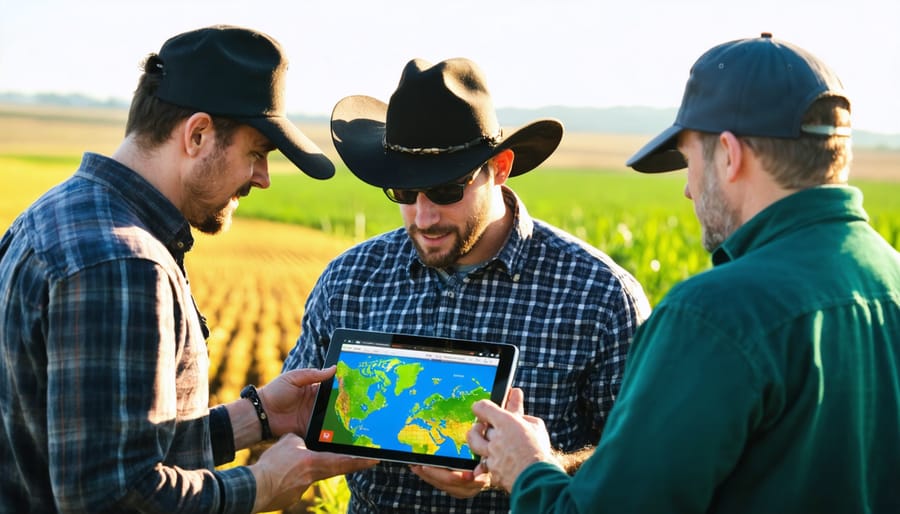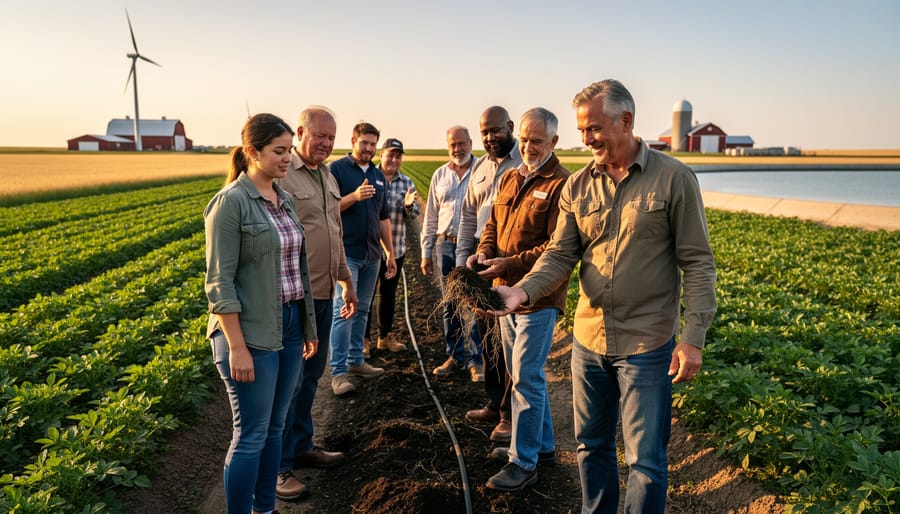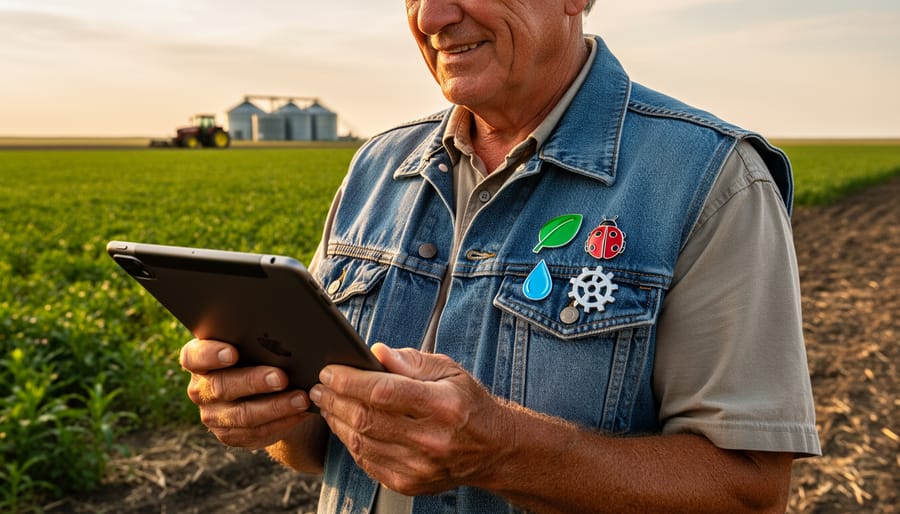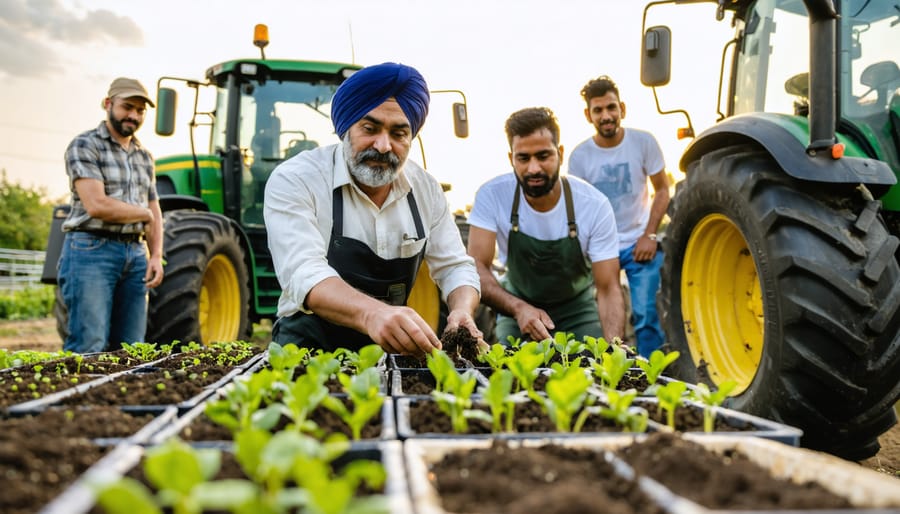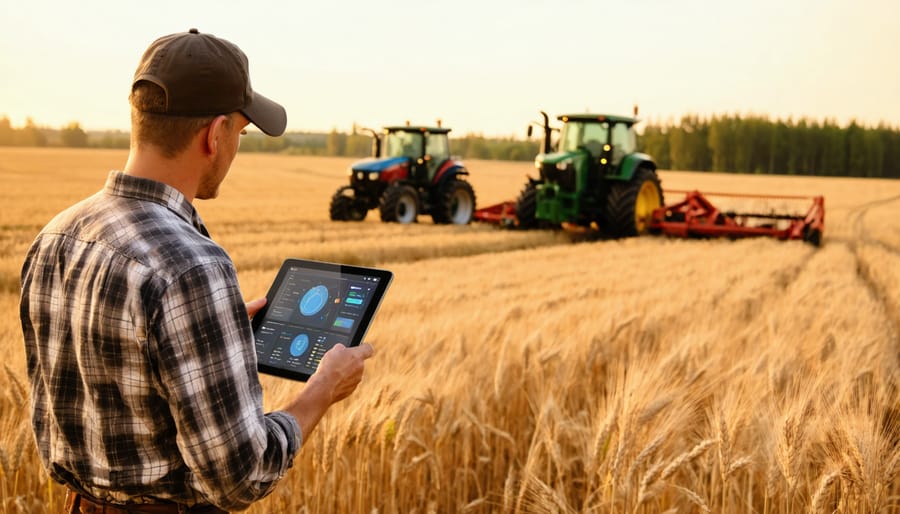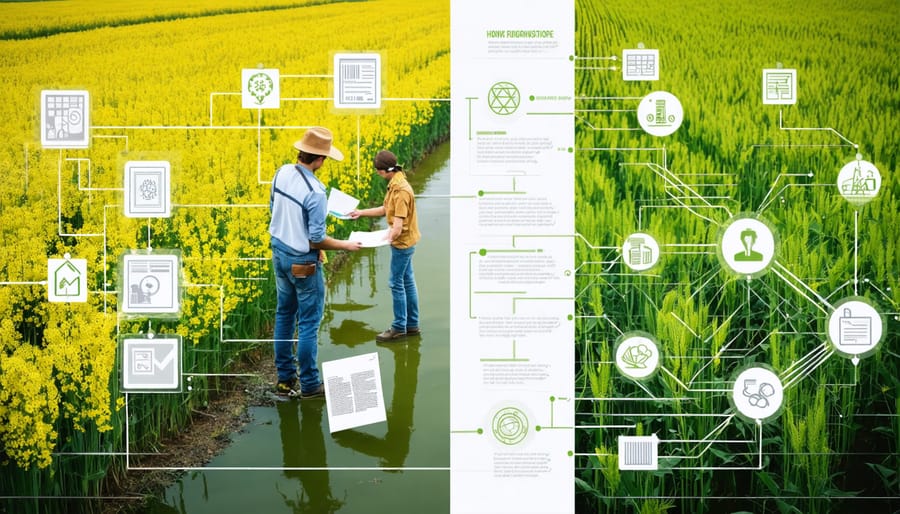Building climate resilience starts at the local level, where Alberta’s farming communities are pioneering climate solutions in farming communities through collaborative action. Extreme weather events, shifting growing seasons, and increasing resource pressures demand a united, community-driven response that transforms challenges into opportunities for innovation and growth.
Across rural Alberta, farmers and community leaders are developing practical solutions that strengthen local food systems, protect vital infrastructure, and preserve agricultural livelihoods. These initiatives combine traditional farming wisdom with cutting-edge climate science, creating resilient networks that support both immediate crisis response and long-term adaptation strategies.
The most successful community climate resilience programs share three essential elements: strong local leadership, inclusive decision-making processes, and practical, measurable actions. By focusing on these core components, Alberta communities are building robust frameworks that protect agricultural assets while fostering innovation and sustainable growth.
This collaborative approach to climate resilience isn’t just about surviving environmental challenges – it’s about thriving through them. When communities work together to implement climate-smart solutions, they create lasting positive change that benefits current and future generations of farmers while strengthening the entire agricultural sector.
Why Community-Led Climate Workshops Matter for Alberta Farmers
Local Knowledge, Local Solutions
When it comes to building climate resilience, Alberta’s farming communities have long recognized that the most effective solutions often come from within. Multi-generation farmers carry valuable knowledge about local weather patterns, soil conditions, and successful adaptation strategies that have worked in their specific regions.
In Vulcan County, for instance, farmers have developed innovative crop rotation systems based on decades of observing how different varieties respond to local conditions. These tried-and-tested approaches, combined with modern climate science, create robust strategies that work for their unique landscape.
Local Indigenous communities also contribute essential perspectives on sustainable land management. Traditional ecological knowledge has helped identify effective water conservation methods and sustainable grazing practices that many Alberta farmers now incorporate into their operations.
Community-led initiatives, such as the farmer-to-farmer mentorship programs in Lethbridge, demonstrate how sharing local expertise can accelerate the adoption of climate-smart practices. These programs have helped newer farmers learn region-specific strategies while preserving valuable agricultural heritage.
By valuing and incorporating local knowledge, communities can develop climate solutions that are both practical and culturally appropriate, leading to higher rates of adoption and success.
Strength in Numbers: The Power of Collective Action
When Alberta farmers come together, remarkable transformations happen. Recent studies show that farming communities working collectively are three times more likely to successfully implement climate-adaptive practices than those working in isolation. In Lacombe County, for instance, a group of 15 grain farmers pooled resources to purchase advanced soil moisture monitoring equipment, reducing water usage by 25% across their combined 4,000 hectares.
The power of collective action extends beyond equipment sharing. Knowledge exchange networks have proven invaluable, with experienced farmers mentoring newcomers in sustainable practices. The Olds Agricultural Society’s mentor program has helped over 50 farms transition to regenerative agriculture methods in the past two years alone.
Community-based initiatives also strengthen negotiating power. Farmers’ cooperatives in Central Alberta have secured better prices for climate-smart technologies through bulk purchasing, while collective marketing efforts have helped members access premium markets for sustainably produced crops. These collaborative approaches not only spread the financial risk of adopting new practices but also create resilient support systems that help communities weather climate challenges together.
Organizing Successful Climate Mitigation Workshops

Workshop Planning Essentials
Organizing an effective climate resilience workshop starts with selecting an accessible venue that can comfortably accommodate your local farming community. Consider scheduling during off-peak farming seasons, typically between November and February in Alberta, to maximize attendance. Aim for a duration of 4-6 hours, including breaks for networking and informal discussions.
Essential workshop components include a clear agenda, local climate data presentations, and interactive activities that encourage participant engagement. Include success stories from nearby farms that have implemented resilience measures, and arrange for local agricultural experts to facilitate discussions. Having a mix of presentation styles – from slideshow presentations to hands-on demonstrations – helps maintain interest and accommodates different learning preferences.
Ensure you have necessary materials ready: handouts with key information, worksheets for planning exercises, and contact information for relevant agricultural support services. Consider providing refreshments sourced from local farms to demonstrate community support. Remember to collect feedback through simple evaluation forms to improve future sessions and maintain engagement with participants through follow-up communications.
Engaging Your Agricultural Community
Building strong community participation starts with understanding your local agricultural landscape. Host regular coffee meetings at community halls or local diners where farmers can share their experiences and concerns in a relaxed setting. Consider establishing a farmer-led steering committee to guide climate resilience initiatives and ensure they reflect real on-the-ground needs.
Create opportunities for peer-to-peer learning through farm tours and field days, where successful adaptation strategies can be demonstrated firsthand. These events can incorporate engaging workshop activities that encourage practical learning and discussion.
Partner with local agricultural societies and 4-H clubs to reach multiple generations of farmers. Use existing community gatherings, like harvest festivals or agricultural fairs, to showcase climate-smart farming practices. Consider establishing a mentorship program pairing experienced farmers who have implemented successful adaptation strategies with those looking to make changes.
Remember to celebrate successes, no matter how small. Share stories of local climate resilience champions through community newsletters and social media. This recognition not only motivates continued participation but also demonstrates the practical benefits of climate-smart agriculture to others in the community.
Measuring Workshop Impact
To ensure our climate resilience workshops create lasting impact, we use a combination of short-term and long-term evaluation methods. We encourage participants to complete pre and post-workshop surveys that measure both knowledge gain and confidence levels in implementing resilience strategies. These surveys include practical questions about specific farming techniques and community organizing skills.
We track attendance numbers and maintain an ongoing database of participating farms, which helps us understand the workshop’s reach within the Alberta farming community. Follow-up interviews conducted three and six months after each workshop provide valuable insights into how farmers are applying what they’ve learned.
Success metrics include the number of new climate-resilient practices implemented, increases in farm-to-farm collaboration, and the formation of local support networks. We’ve found that measuring both quantitative data (like hectares under improved management) and qualitative feedback (such as personal success stories) gives us the most complete picture of workshop effectiveness.
Regular feedback from participants helps us continuously refine our program content and delivery methods, ensuring we meet the evolving needs of our farming community.
Real Success Stories: Alberta’s Climate-Ready Communities
The Leduc County Carbon Initiative
In 2019, Leduc County farmers partnered with local agricultural experts to launch an innovative carbon reduction program that has since become a model for rural climate action across Alberta. The initiative focused on three main areas: sustainable crop rotation, precision agriculture technology, and carbon sequestration through improved soil management practices.
Led by third-generation farmer Sarah Thompson, a group of 45 local producers implemented changes that reduced their collective carbon emissions by 32% over three years. “We proved that environmental stewardship and profitable farming can go hand in hand,” Thompson explains. “It’s about making smart choices that benefit both our land and our bottom line.”
Key to the program’s success was the adoption of minimal tillage practices and the introduction of cover crops, which helped improve soil health while capturing carbon. Participating farms also invested in GPS-guided equipment and variable-rate technology, reducing fuel consumption and fertilizer use by an average of 25%.
The initiative received support from the Agricultural Climate Solutions program, which provided funding for soil testing and equipment upgrades. Regular workshops and field days helped farmers share knowledge and troubleshoot challenges together. The program’s success has inspired neighboring counties to develop similar initiatives, creating a growing network of climate-conscious farming communities across the province.
Today, the Leduc County Carbon Initiative continues to expand, with new participants joining each season and documented improvements in both soil health and farm productivity.
Red Deer’s Regenerative Agriculture Network
In the heart of central Alberta, Red Deer’s Regenerative Agriculture Network has emerged as a pioneering force in community-based climate resilience. This grassroots initiative brings together local farmers, agricultural specialists, and community members to implement innovative soil health improvement practices across the region.
The network operates through a hub-and-spoke model, with experienced regenerative farmers mentoring newcomers to sustainable practices. Monthly gatherings at participating farms allow members to share knowledge, discuss challenges, and celebrate successes in implementing techniques such as cover cropping, reduced tillage, and rotational grazing.
What sets this network apart is its collaborative approach to resource sharing. Members pool equipment, share seeds, and coordinate bulk purchases of soil amendments, making regenerative practices more accessible to smaller operations. The network has established a seed library featuring climate-resilient crop varieties adapted to central Alberta’s growing conditions.
Local success stories include the Johnson Family Farm, which reduced water usage by 40% through improved soil organic matter content, and the Prairie View Collective, which documented a 25% increase in soil carbon levels over three years. These achievements demonstrate how community-driven initiatives can create tangible environmental benefits while strengthening agricultural resilience.
The network also maintains partnerships with agricultural research institutions, ensuring that traditional farming wisdom combines with current scientific understanding to develop practical solutions for local conditions.


Resources and Support for Your Community
Funding Opportunities
Several funding opportunities are available to support community climate resilience initiatives in Alberta. The Canadian Agricultural Partnership (CAP) offers grants up to $100,000 for projects focusing on sustainable farming practices and climate adaptation strategies. Farmers can apply for funding to implement water management systems, drought-resistant crop varieties, and soil conservation methods.
The Alberta Climate Change Innovation and Technology Framework (CCITF) provides matching grants ranging from $25,000 to $500,000 for communities implementing innovative climate resilience solutions. This program specifically supports projects that combine traditional agricultural knowledge with new technologies.
Local agricultural societies can access the Agricultural Initiatives Program, which offers funding between $5,000 and $50,000 for community-based projects. These funds can support workshops, educational programs, and collaborative climate adaptation initiatives.
The Farm Credit Canada (FCC) AgriSpirit Fund provides grants up to $25,000 for rural community projects. Communities can use these funds to develop emergency response plans, install weather monitoring systems, or create community gardens.
Municipal governments can apply for the Municipal Climate Change Action Centre (MCCAC) grants, which support climate resilience planning and implementation. These grants cover up to 80% of project costs for initiatives like climate risk assessments and adaptation strategies.
Remember to check application deadlines and eligibility requirements, as funding cycles vary throughout the year. Your local agricultural fieldman or regional representative can provide guidance on application processes and help identify the most suitable funding opportunities for your community’s needs.
Expert Networks and Technical Support
When facing climate challenges, you don’t have to go it alone. Alberta’s agricultural community is supported by a robust network of experts and technical resources ready to help. The Alberta Climate Information Service (ACIS) provides detailed weather data and forecasting tools specifically designed for agricultural decision-making.
For hands-on assistance, Agricultural Service Boards (ASBs) in your county can connect you with local experts who understand regional climate patterns and soil conditions. These professionals can help assess your farm’s specific needs and recommend appropriate renewable energy solutions and adaptation strategies.
The Canadian Agricultural Partnership (CAP) program offers technical support through workshops and one-on-one consultations. Their network includes agrologists, soil scientists, and climate adaptation specialists who can guide you through implementing resilience measures on your farm.
Digital resources are also available through Alberta Agriculture’s website, featuring webinars, online courses, and downloadable guides. The Environmental Farm Plan (EFP) program provides technical advisors who can help you develop a comprehensive climate resilience strategy tailored to your operation.
For immediate assistance, the Ag-Info Centre (310-FARM) connects you with specialists who can answer urgent questions about weather-related challenges and provide guidance on adapting your farming practices to changing conditions.
Building climate resilience in our agricultural communities is a shared responsibility that requires dedication, collaboration, and active participation from all members. Throughout Alberta, we’ve seen remarkable examples of farmers and communities coming together to strengthen their adaptive capacity and create sustainable solutions for the future.
By implementing the strategies and approaches discussed, your community can develop a robust framework for addressing climate challenges while maintaining agricultural productivity and environmental stewardship. The success stories from regions like Lethbridge County and Red Deer demonstrate that when communities work together, they can achieve significant progress in climate adaptation and mitigation.
Remember that every contribution matters, whether it’s participating in local climate workshops, sharing knowledge with neighbouring farms, or implementing sustainable practices on your own land. The networks and partnerships you build today will become the foundation of tomorrow’s resilient agricultural community.
We encourage you to take the first step by connecting with your local agricultural association or conservation authority. Share this knowledge with your neighbours and consider organizing a community meeting to discuss climate resilience strategies. The tools and resources are available – now it’s time for action.
Together, we can build stronger, more resilient farming communities that will continue to thrive for generations to come. Your involvement in this journey isn’t just about protecting your own farm – it’s about securing the future of Canadian agriculture.

